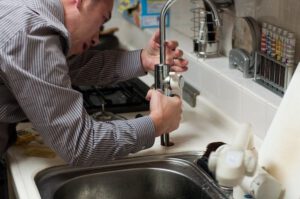A plumber is a professional who installs drainage, potable water, and sewage systems. This type of professional also handles repairs and maintenance for such systems. Here are some tips to help you find a good plumber in your area. You might also be interested in learning more about the job of a plumber. Keep reading for more information! Listed below are some of the most common tasks performed by a plumber. Listed below are the top benefits of hiring a plumber.

Plumbing is a versatile profession that requires good communication skills. It requires an individual to analyze the problem, come up with a realistic solution, and resolve any problems that may arise. This profession is also very demanding, requiring someone with an understanding of science and mathematics. A plumber may also be responsible for assisting other professionals, such as Electricians, and troubleshooting plumbing problems. In addition to performing plumbing tasks, a plumber must collaborate with other professionals, including building owners, business managers, and homeowners.
A plumber’s duties typically include installing and repairing pipes. The term “plumber” derives from the Latin word plumbum, which means “lead”. It was often used for drain pipes and conduits in Roman times. In medieval times, any person who worked with lead was called a plumber. Listed below are some other tasks performed by a plumber.
Many plumbers travel to various work sites each day. This job entails working in cramped spaces. They are also exposed to bad weather and must be physically fit to handle the physical demands of the job. Despite the risks involved, job growth is anticipated in the next decade. Moreover, plumbers will often have full-time jobs, so their schedules will probably be full during the day. Some plumbers work weekends and evenings, and they will likely work overtime to meet customer needs.
The plumbing professional can be lucrative. A plumber is often the first trade worker that is called upon in plumbing emergencies. Their main responsibilities include fixing drains, unclogging toilets, and repairing burst pipes. Other tasks can include installing plumbing systems, such as sewer drainage, fixtures, and water heaters. Plumbing jobs also require good mechanical skills and a physical aptitude to work in small spaces. The plumbing field also requires basic math skills. Once a plumber has graduated, they can expect to earn an average salary of $48,000 per year.
Plumbing is a complex field and one that requires high physical strength and flexibility. Good motor skills, great attention to detail, and flexibility are important requirements for a plumber. As a plumber, you’ll be responsible for installing pipes, repairing leaks, and even installing HVAC systems. All of these tasks will require a high degree of skill and safety. If you have these attributes, you’ll be well-equipped to take on this challenging career.
Before becoming a plumber, it is essential to have a high school diploma. Although many employers will provide on-the-job training, attending technical school is often beneficial. Courses offered in plumbing apprenticeship training programs include pipe systems, safety, and tools. Some apprenticeships may even include welding training. Apprenticeship programs typically take four to five years to complete. Once a plumber has completed an apprenticeship, they are known as journey workers, and additional years of experience and training can lead to master status. To work in this field, you must obtain a license.
Although most plumbers are self-employed, many prefer to work for larger institutions. Large buildings like colleges and universities employ plumbing staff. Airports and municipalities also have plumbing staff. Even the military needs plumbers. This may require previous experience in the military. In addition, yachts and large airplanes need plumbing systems, and motor vehicles need them, too. Despite this shortage, employment opportunities are promising. You may find yourself working for a large corporation or even a small company.
When looking for a plumber, remember to check if they are licensed and insured. Plumbers are required by law to be licensed in their state and must be certified in the area they work in. Some states require a minimum number of years of practical experience, but not all. You can find out about licensing requirements in your state by visiting the website. A plumber’s job is physically demanding and can be stressful, so consider your lifestyle and work-life balance before hiring a plumber.
Apprenticeships are another option for a plumber. Apprentice plumbers work under more experienced plumbers, learning on the job and developing their skills. A plumber who has completed an apprenticeship will be able to perform more complex jobs, such as installing pipes, fixtures, and appliances. As a journeyman plumber, you may also specialize in one or more areas of plumbing. If you have the skills and desire, a plumber can pursue further training to become a licensed professional.